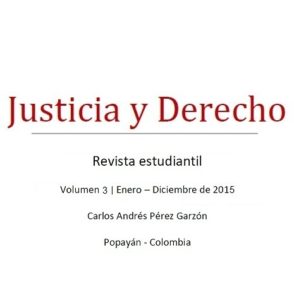The role of innovation transfer mechanisms in economic development: perspectives and legal approach
Resumen
Currently, innovation depends largely on the efficiency of the legislation concerning means to transform knowledge into innovation, and the mechanisms of international innovation transfer. The way and speed of knowledge transmission and know-how are crucial for the economic development of a nation. The following paper explores, first, the status of the legal framework for innovation transfer articulated with an economic analysis; then, the main features of the regulations on intangible property for the Colombian case are identified; finally, conclusions are drawn in terms of economic and legislative policies.
Descargas
Disciplinas:
Derecho, economíaLenguajes:
Inglés, Español; CastellanoDerechos:
Licencia Creative Commons Atribución-NoComercial-SinDerivar 4.0 InternacionalReferencias bibliográficas
Acuerdo de Promoción Comercial entre la República de Colombia y Estados Unidos de América, EE.UU.-COL, Ch. 16, November 22th, 2006, http://www.mincit.gov.co/descargar.php?id=65804> (last visited on September 25, 2016).
Bernard Hoekman et al., Transfer of technology to developing countries: unilateral and multilateral policy options, 33 World Development, n.° 10, 1587, 1593 (2005).
Cesar Moreno, Evolución de la protección penal del Derecho de Autor en Colombia, Revista de Derecho, n.° 34, 147, 147-176 (2010).
Christian Deblock, Présentation du dossier: innovation et développement chez Schumpeter, 46 Revue Interventions économiques, 1, 1-36, (2012).
Comunidad Andina de Naciones (CAN), Decision 291, March 3th, 1991.
Comunidad andina de Naciones (CAN), Decision 486, September 14th, 2000.
Darius Mahdjoubi, Schumpeterian Economics and The Trilogy of Invention-Innovation-Diffusion, UT School of Information, http://www. ischool. utexas. edu/~ darius/17-Schumpeter-innovation. pdf (last visited on September 25, 2016).
David Haug, International Transfer of Technology: Lessons That East Europe Can Learn from the Failed Third World Experience, 5 Harv. J.L. & Tech 209, 210 (1991).
Decree 2080 of 2000. Por el cual se expide el Régimen General de Inversiones de capital del exterior en Colombia y de capital colombiano en el exterior, [Ministerio de Gobierno, Colombia].
Decree 591 of 1991, [Ministerio de Gobierno, Colombia], arts.1-5.
Emese Borbély, J. A. Schumpeter und die Innovationsforschung (Budapest: Óbuda University, Keleti Faculty of Business and Management, 2008).
Ernesto Rengifo, Intangible Property (2015), (lecture taught at the International School “Copyright and author’s rights in the face of the new developments in the creative industries”, Universidad Nacional de Colombia).
Following M. Frenz & R. Lambert, Exploring Non-technological and Mixed Modes of Innovation Across Countries, in Innovation in Firms: A Microeconomic Perspective 71, 72 (OECD, Paris: OECD Publishing, 2009); OECD, OECD Science, Technology and Industry Outlook 2012 166-168 (Paris: OECD Publishing, 2014); Tobias Schmidt & Christian Rammer, Non-technological and Technological Innovation: Strange Bedfellows? 4 (2007) (ZEW Discussion Papers No. 07-052).
The Administrative Department of Science, Technology and Innovation (COLCIENCIAS) promotes public policies to encourage Science, Technology and Innovation (ST & I) in Colombia; Nestor López, Colombia busca dar gran salto en trámite para patentes, Portafolio, (September 1st, 2015), http://www.portafolio.co/portafolio-plus/colombia-busca-incentivar-patentes (last visited on September 25, 2016).
Intergovernmental Panel on Climate Change, Summary for Policymakers Methodological and Technological Issues in Technology Transfer, https://www.ipcc.ch/pdf/special-reports/spm/srtt-en.pdf (last visited on September 25, 2016).
International Centre for Trade and Sustainable Development, Climate Change, Technology Transfer and Intellectual Property Rights 2, (August 2008), https://www.iisd.org/pdf/2008/cph_trade_climate_tech_transfer_ipr.pdf
Jacques Liouville, La fonction d’entrepreneur: Schumpeter revisité (2002) (actes du 2ème congrès de l’Académie de l’Entrepreneuriat «Entrepeneuriat et dynamique des sociétés», Université Montesquieu – Bordeaux).
Jesús Villamil, Intangible Property Management and Technology Transfer (2015) (lecture taught at the International School Copyright and author’s rights in the face of the new developments in the creative industries, Universidad Nacional de Colombia).
Jonas Mitasiunas, Innovation and Technology Transfer, http://www.bonita-project.eu/cms_uploads/files/a02innovationtech.pdf (last visited on September 25, 2016).
Keith Maskus, Encouraging international technology transfer 9 (2004) (Issue Paper N.° 7, International Centre for Trade and Sustainable Development).
Klaus Esser et al., Competitividad sistémica: nuevo desafío para las empresas y la política, 59 Revista CEPAL 39, 39-52 (1996).
Knut Koschatzky, Fundamentos de la economía de redes. Especial enfoque a la innovación, 4 Economía Industrial, n.° 346, 15, 15–26 (2002); Jorge Niosi et al., Les systèmes nationaux d’innovation: à la recherche d’un concept utilisable, 7 Revue française d’économie, n.° 1, 215, 215-250 (1992).
Kristen Riemenschneider, Philosophy, Trade, and Aids: Current Failures to Obtain a Substantive Patent Law Treaty, 11 Virginia Journal of Law and Technology, n.° 5, 1 (2006).
Ley 1669 de 2013, art. 4.
Ley 1753 de 2015.
Liliana Lizarazo Rodríguez & Phillip de Lombaerde, Regional and inter-regional economic rules and the enforcement of the right to health: The case of Colombia, 15 Global Social Policy, n.° 3, 296, 296-312 (2015).
Luis Angel Madrid, The New Creative industries and the Free Trade (2015) (lecture taught at the International School “Copyright and author’s rights in the face of the new developments in the creative industries”, Universidad Nacional de Colombia).
Marga Gual Soler, Intergovernmental Scientific Networks in Latin America, (2014), http://www.sciencediplomacy.org/article/2014/intergovernmental-scientific-networks-in-latin-america (last visited on September 25, 2016).
OECD, National Intellectual Property Systems, Innovation and Economic Development with Perspectives on Colombia and Indonesia, (OECD Publishing, 2014).
OMC, Acuerdo Sobre la Propiedad Intelectual, April 15, 1994.
Oxford Dictionaries, knowledge, https://en.oxforddictionaries.com/definition/knowledge (last visited on September 25, 2016).
Oxford Dictionaries, Technology, https://en.oxforddictionaries.com/definition/technology (last visited on September 25, 2016).
Philip Mendes, Concession de licences et transfert de technologie, OMPI, http://www.wipo.int/sme/fr/documents/pharma_licensing.html#author (last visited on September 25, 2016).
Salomón Kalmanovitz, Oportunidades y Riesgos de la Globalización para Colombia, Banco de la República de Colombia, (February 2000), http://www.banrep.gov.co/sites/default/files/publicaciones/archivos/theglobe.pdf.
See, Álvaro Ramirez Bonilla, The State of Intellectual Property in Latin America: Legal Trends, Economic Development and Trade (Bogotá: B&R Latin America IP, 2012).
UNCTAD, Transfer of technology and knowledge-sharing for development: Science, technology and innovation issues for developing countries 39 (2014) (UNCTAD Current Studies on Science, Technology and Innovation N.° 8, United Nations).
WIPO, WIPO Intellectual Property Handbook: Policy, Law and Use 17 (2008); European Patent Office, Guidelines for Examination in the European Patent Office part G, chapter 2, numeral 1 http://www.epo.org/law-practice/legal-texts/html/guidelines/e/g_ii_1.htm (last visited on September 25, 2016).
World Intellectual Property Organization, WIPO studies on the economic contribution of the copyright industries 1-35, (2013), http://www.sqn.ba/article_files/280_1_economic_contribution_analysis_2012.pdf (last visited on September 25, 2016).







.png)



